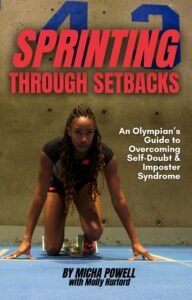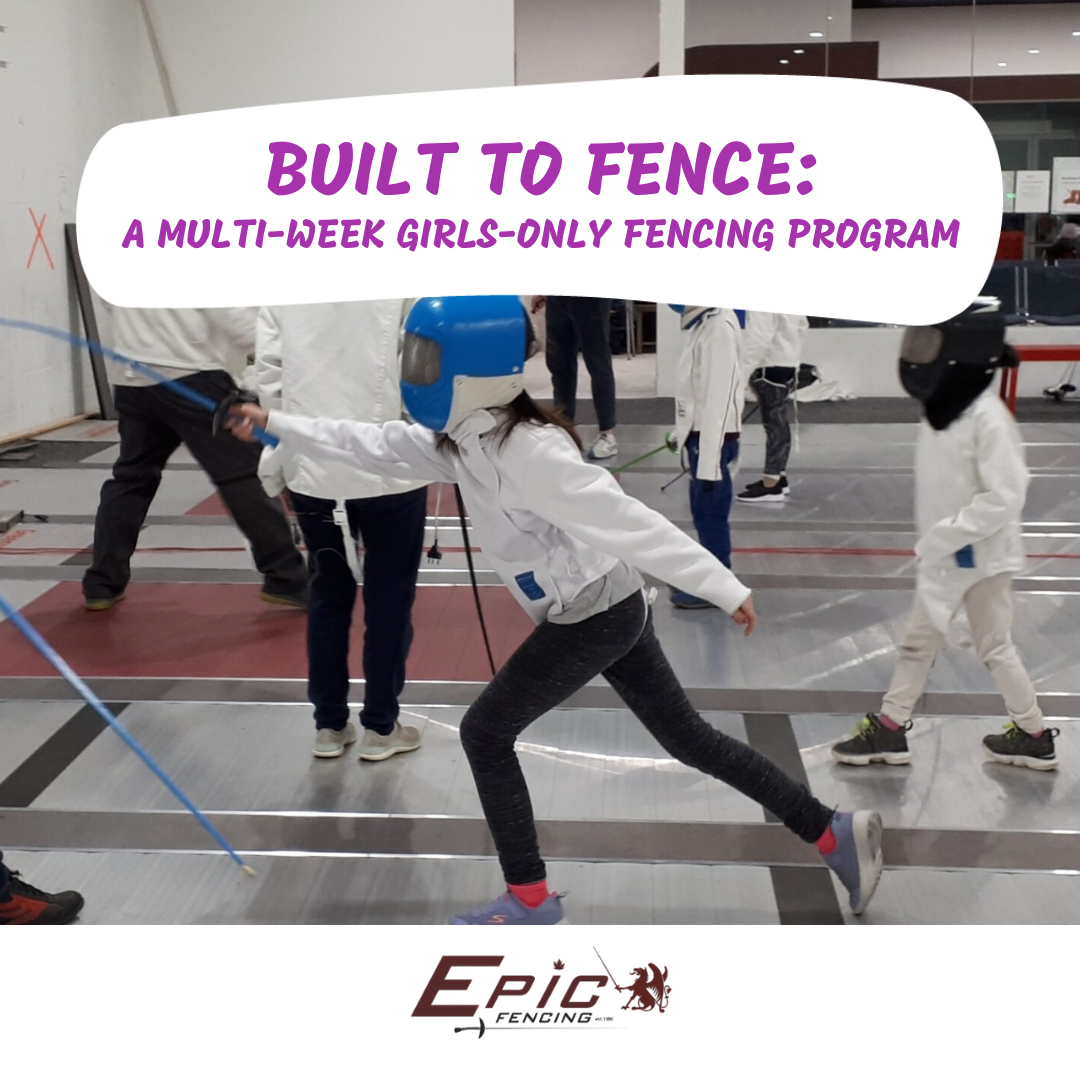“The more women move, the better women feel. Yet, over half of the women are…

1:1 with Canadian Track Star Micha Powell
Being the daughter of two Olympians sounds like a dream if you’re an athlete. But it comes with plenty of pressures and hurdles! For Micha Powell, that’s just part of life.
Micha is a world-class Canadian Olympic sprinter specializing in the 400-meter. She’s a 2022 Commonwealth Games gold medalist and track is a part of her DNA—and she wants to share everything she’s learned on the track and in her life so far! That’s why she wrote “Sprinting Through Setbacks: An Olympian’s Guide to Overcoming Self-Doubt and Imposter Syndrome.” It’s a collection of essays that looks back at pivotal races in Micha’s career and the lessons learned from each.
From finding balance, owning your personal style, battling imposter syndrome, stepping into your spotlight, and finding the courage to embrace an Olympic mindset, there’s a lot to learn, whether you’re a runner, a student, or an office worker. If you’re chasing a big dream, you’ll resonate with Micha in her latest book.
Here, we wanted to get to know Micha a bit more and get some of her best advice to take with us into the Olympic season, heading back to school, and just thinking about that next big goal of yours!
When did you first get interested in track and field?
 It was the summer of 2012 and I was watching the London Olympics. The 100 meter sprint came on, and for some reason, I asked my mom to time me to see how fast I could do it. We went to this little concrete track and she timed me and it was around 13 seconds. And she said, ‘That’s pretty good.’ That was enough for me: I signed up for track and field for that indoor season. I wasn’t running incredible times or anything, but I fell in love with the 400-meter distance, and within a season, I had dropped five seconds from my time. That’s a big, fast drop when you’re already running a decent time, and it showed that I had this potential.
It was the summer of 2012 and I was watching the London Olympics. The 100 meter sprint came on, and for some reason, I asked my mom to time me to see how fast I could do it. We went to this little concrete track and she timed me and it was around 13 seconds. And she said, ‘That’s pretty good.’ That was enough for me: I signed up for track and field for that indoor season. I wasn’t running incredible times or anything, but I fell in love with the 400-meter distance, and within a season, I had dropped five seconds from my time. That’s a big, fast drop when you’re already running a decent time, and it showed that I had this potential.
I just loved the 400 meter distance from the first time I did it. I enjoyed running cross country, but sprinting is just so exhilarating. It really gave me a good perspective of what a healthy sport looked like, too—I was lucky to have good coaches even then.
What were some of the early challenges you faced getting into track and field?
Honestly, it was the fact that I wasn’t running that fast at first. I had to get used to not being the best at something, and when you have two parents who were both Olympic sprinters and set world and national records, you feel that internal pressure to perform. I had to get used to that, and embrace that rather than being an instant success, I was learning something at every race. Instead of getting frustrated with the fact that I wasn’t winning all the time, I tried to focus on the fact that my times were slowly improving. Every time I went to practice, I would tell myself that I was going to try my best, no matter how hard the workout was. I realized that the only way you can be the best is if you keep showing up and practice and keep pushing yourself.
How did you stay motivated when things weren’t going your way?
Every athlete has the moment of feeling like, ‘I’m done, I want to quit.’ But I think what always kept me motivated was coming back to what made track fun in the first place. I try to incorporate some lightness in my everyday life. I’d do my best in my workouts, and I’d make sure that I was taking care of myself off the track and working on my positive self-talk. I also made it a point to keep track of my progress, even the tiny little things, so that when I was feeling unmotivated, I could look back and see how far I’ve come. To be able to look back at that is really enlightening.
I always tell the girls who message me looking for motivation that you have to bring back that spark that initially got you into that sport. Find that joy again!
You’ve also dealt with some injuries over the years; How do you handle those?
 Track runners deal with injury a lot—it’s pretty much part of being a runner! My injuries have always been tricky because they’ve been just bad enough that competition is really difficult, but I can technically still run. For me, it’s all about really knowing my limits. For example, in 2017, I had a hamstring strain so running was painful. It was a clear sign that I needed to take a break, but I was itching to come back. I really had to force myself to take that break, and when I did come back, I was able to still perform at the level I wanted to.
Track runners deal with injury a lot—it’s pretty much part of being a runner! My injuries have always been tricky because they’ve been just bad enough that competition is really difficult, but I can technically still run. For me, it’s all about really knowing my limits. For example, in 2017, I had a hamstring strain so running was painful. It was a clear sign that I needed to take a break, but I was itching to come back. I really had to force myself to take that break, and when I did come back, I was able to still perform at the level I wanted to.
More recently, I had a tibia injury, and unfortunately, it took a while to diagnose it and realize that I needed to stop running. It was really hard to have to make the call that I needed to stop running when we still weren’t sure what the injury was, but luckily, I was finally able to get it diagnosed and start working on healing it. Looking back, I know that if I kept just pushing through, I don’t think it would have ever healed properly.
My most recent injury was a relatively minor hip injury that happened at the worst possible time. I’d finally healed from the tibia issue and was training and racing really, really well. But then in May, this hip injury happened, and it was just bad enough that I had to, again, go back to the drawing board. I had to focus on rehab super intensely, with less than a month to make the Olympic team. I knew it would be a long shot, and unfortunately I didn’t make the team—but now I’m set up to finish the season really strong.
How important is having a strong support system through all of these moments?
It’s so key. I have a lot of young girls asking me what to do when you don’t really get along with your coach or you don’t feel like you have a lot of support, and I know how hard that struggle can be. At the end of the day, you’re the only one who really knows what your body needs and what kind of support you need. If you can verbalize that to the people you trust, whether it’s a coach or a physical therapist or a friend or a parent, that can be so helpful. A lot of the time, you have people who really do want to support you but may not know how or what you need.
Right now, my mom—a three-time Olympian—is my coach and it has been incredible. We have heartfelt chats, we have fun, light chats, and we have super serious game plan race day chats. She’s really helped me be the best athlete that I can be now. I’m also so lucky to have friends and family who all understand this is a really intense journey. You don’t just wake up one day and then woohoo, you’re an Olympian. It takes a lot of sacrifice, a lot of focus, and at the same time, a lot of experimentation.
And finally, if you aren’t getting support from outside, make sure you’re doing what you can to support yourself. If it starts to feel like it’s all too much, take a step back and really assess your current environment and what you’re doing.
How do you improve your self-confidence?
A lot of girls run into these moments where they stop having confidence in themselves. They start doubting themselves, especially if they don’t have a great support system. I think for girls, it’s really important to write down and take note of the moments that do go your way, the things that can make you feel more confident in yourself. We focus so much on the negative and what we did wrong, but I think we need to take more time focusing on what went well!
Really recount those moments when you feel great about yourself, whether it’s after a great meet or great practice. Write down what happened and how you’re feeling. That helps you start to get better at positive self-talk.
How have you managed to balance sport and work and school?
What a great question because especially as women, I think we always feel like we have to do it all to prove that we can and that we’re productive in society and worthy of congratulations and praise. But at the end of the day, filling up your plate just to have it be full, just to have some things on the calendar, doesn’t make sense. I actually love to scale back a bit and make space. So I’ll look at what I have on my schedule and make sure that it aligns with my goals or brings me joy.
If I see something on my calendar that I’m doing out of fear or out of guilt, I think those are really good signs that I need to set better boundaries and say no to some things. Even when it comes to training, I think sometimes we get in our heads as women, that we want to make sure that we are strong and capable and that’s great… But overtraining can have the opposite effect.
Take a second. Take a pause. Talk to your coach. Think about what you need. I’m noticing more and more that I love community, but at the same time, I love to have my own space. So I’ve had to say that Sundays are my quiet day where I don’t make social plans, I spend time with myself. Then I’m ready to go Monday through Saturday.
As hardworking girls and women, we just need to just remind ourselves that we can’t do it all… and there’s no reason that we have to.
Why is it important for young women to still make time for physical activity even when they are busy?
It comes back to self love and just remembering that we need to do things for ourselves in order to be able to show up for others. Staying active every day, even for 10 minutes, can be so helpful for our mental and physical health. I think people have this misconception that they have to run super long, or they have to do a one hour HIIT workout to be active—but that’s not the case. Just make a few minutes sometime during the day to do some movement whether that’s a run or a walk, a strength session or a yoga video. Look for something that feels fun for you and you’ll be more likely to make time for it!
I find that if you’re giving yourself that time with your body to really get strong and mentally clear, it helps you become more present. I don’t look at my phone when I’m moving my body. I’m not trying to do 10 things at once. It’s my time.
 It’s also a great way to spend time with friends! For girls, I think it’s so cool to do workouts together. I think it gives you an incentive to workout, it’s a nice way to change up your day, and it combines being social with doing something really good for yourself.
It’s also a great way to spend time with friends! For girls, I think it’s so cool to do workouts together. I think it gives you an incentive to workout, it’s a nice way to change up your day, and it combines being social with doing something really good for yourself.
Want to learn more from Micha?
Whether you want more tips on finding balance in a busy time, battling imposter syndrome in school or in sport, or you’re even looking for some style inspiration, check out Sprinting Through Setbacks here (and get the workbook for some guided journaling) and follow Micha on Instagram!



